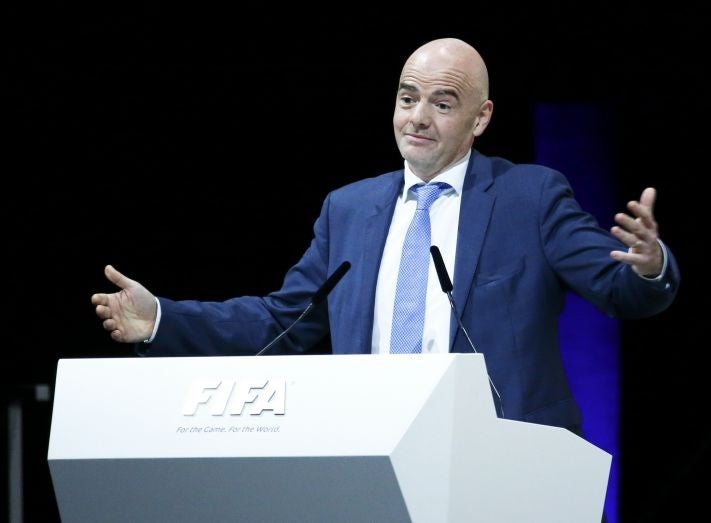Fifa has taken its first step in restoring credibility to football’s governing body – but there is a long way to go
By voting Infantino not Salman, Fifa has staved off its endgame, at least for the time being

Your support helps us to tell the story
From reproductive rights to climate change to Big Tech, The Independent is on the ground when the story is developing. Whether it's investigating the financials of Elon Musk's pro-Trump PAC or producing our latest documentary, 'The A Word', which shines a light on the American women fighting for reproductive rights, we know how important it is to parse out the facts from the messaging.
At such a critical moment in US history, we need reporters on the ground. Your donation allows us to keep sending journalists to speak to both sides of the story.
The Independent is trusted by Americans across the entire political spectrum. And unlike many other quality news outlets, we choose not to lock Americans out of our reporting and analysis with paywalls. We believe quality journalism should be available to everyone, paid for by those who can afford it.
Your support makes all the difference.A career football administrator from Switzerland has been elected president of Fifa – and we are led to believe that everything has changed. Gianni Infantino’s victory in Fifa’s emergency election yesterday came as a shock. In the six months since the US Department of Justice detonated a bomb under Fifa, its scattered smithereens have talked all the right talk on reform, of good governance, on rebuilding itself for the future. But this was an election that took place with its institutionally corrupt structures very much intact, and as such a Bahraini sheikh with very little interest in football, and who is implicated in a case of torture of players from his own country, was expected to win with ease.
The threatening legal letters that arrive in their hundreds every day at media organisations all round the world all point out that the sheikh “aggressively denies” that he ever did what was asked of him, namely to identify among the pro-democracy campaigners of 2011 anyone from the country’s sporting elite, so that they might be made an example of.
Whatever the truth, on the day that Fifa had to take a giant leap towards restoring its image or face extinction, human rights campaigners lined the streets outside Zurich’s Hallenstadion, holding up posters of beaten-up Bahrainis. It’s possible they changed a few minds.
There is no great reason to imagine the “Fifa family”, as it likes to call itself, is any less malign an organisation than before. But with 24 of its 37 sponsorship slots lying open, and facing legal bills of a reported £7m a month, in the quiet silence of the voting booth evidently enough of them decided that change was needed.
There will be consequences. Mr Infantino, the secretary general of Fifa’s European Confederation (known as Uefa) was only ever meant to be a placeholder. Had Michel Platini, his president, been cleared of wrongdoing in time to re-enter the race, Mr Infantino would have stepped aside. That didn’t happen, and now Fifa has an accidental president.
His track record at Uefa is one of protecting the interests of the richest clubs. They do not only take the most money, but they also generate the most. Among his fiercest critics throughout the campaign was a Frenchman, Jérôme Champagne, a former diplomat and Fifa official who argued forcefully that football must not be run in the interests of rich and powerful Europe. The fear that Europe would do just that was enough to make a Bahraini sheikh who didn’t even bother to attend the World Cup Final in Brazil the front-runner. It was for this reason that the African Federation didn’t even back its own man, an anti-apartheid activist who was jailed with Nelson Mandela on Robben Island.
Sepp Blatter eventually stood down, saying he did not feel he had a mandate from “the whole of football”, from its millions of fans. Mr Infantino has pledged to increase the World Cup from 32 teams to 40. It will fundamentally alter and, in the eyes of the average fan, damage the tournament – Fifa’s crown jewel.
Earlier in the day, Fifa’s delegates voted through extensive reforms aimed at introducing good governance, functional management structures, salary disclosure for top executives, and other such things that are expected of such entities as a small chain of toy shops.
It will succeed in reforming itself only once it stops being a magnet for the worst kind of people. By voting Infantino not Salman, Fifa has staved off its endgame, at least for the time being. It has long been argued the organisation will have restored its credibility only once nobody knows who its president even is. In Gianni Infantino, it has taken a sizeable step towards that future.
Join our commenting forum
Join thought-provoking conversations, follow other Independent readers and see their replies
Comments